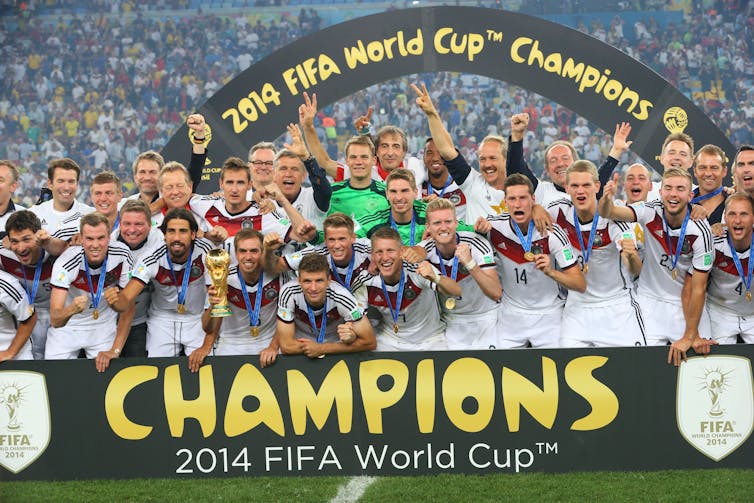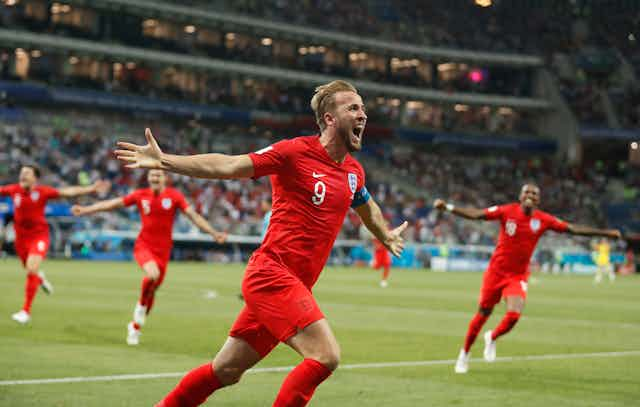Playing at the FIFA World Cup, the biggest international football tournament, is considered to be the pinnacle of a footballer’s career. Individual players are usually the first to be mentioned by pundits, commentators and fans when discussing teams at the event. But rather than individual brilliance it is often the collective dynamics that determines how a team performs on the world’s greatest stage.
Spain, one of the favourites to win the 2018 World Cup, sacked their manager just two days before their first match. The impact of this on Spain’s performance is yet to be fully determined – although they put in a great performance in their first game against Portugal.
The timing of the decision by the Spanish football federation is certainly questionable. The impact of poor team dynamics was seen at the 2010 World Cup with the French national team. The squad was in disarray, with a key player being sent home in the early stages of the tournament resulting in a bust-up and the team refusing to train. Despite high expectations and brilliant individual players, France were knocked out during the group stages.
How players and coaches collectively withstand pressure – the notion of team resilience – is a hallmark of great teams. We recently investigated the concept of team resilience in an elite sport context.
In one study, we looked specifically at the England Rugby Union World Cup-winning team of 2003. Our findings revealed five main processes underpinning team resilience: transformational leadership (inspiring team members’ commitment to their shared vision despite setbacks), shared team leadership (a wide distribution of team members’ responsibilities), team learning (sharing knowledge of setbacks), social identity (developing a distinctive team identity), and positive emotions (promoting humour despite setbacks).
Interestingly, these features of team resilience can be seen in the current England World Cup football team. As manager, in comparison to his predecessors, Gareth Southgate has shown calm leadership on and off the pitch, clarity of thinking and flexibility under pressure.
There is a genuine sense of togetherness in the team. Everyone appears to get along with one another, no matter what domestic club they play for. This is a marked improvement on previous England squads, especially the so-called “Golden Generation” in which club rivalries are reported to have created separate cliques.
This strong sense of identity in the current England squad is reinforced by the fact that a lot of the team have played together (successfully) in the younger age groups. This is a similar approach to the one used by the German national team (2014 World Cup winners). They invested heavily in their youth set-up, both domestically and nationally, by developing home grown players.
Psychological safety
Another important feature of team resilience that has emerged from our work is the notion of psychological safety – where team members feel safe to take risks and be vulnerable in front of each other. This has been identified by tech giant Google as one of the most important qualities of high-performing teams in any sphere.
Creating a psychologically safe environment is very much the philosophy of Southgate’s leadership. This is nicely illustrated in an interview after England earned a 2-0 win over Costa Rica in their final World Cup warm-up match. Praising the performance of Marcus Rashford, he said:
I wanted him, like all the others, to be making mistakes because if they are making mistakes then they are trying things. And for me, all of our players, if they want to try and be as good as they can be, have got to try things. And we have to accept that that might mean that there’s the odd failure but what you then maybe get is the odd moment like he has produced tonight which is “wow”.
So while his predecessors may have been crippled by previous tournament disappointments, Southgate has fostered an air of positivity and developed a squad not scarred by previous failures.
A key overarching message is that the quality of relationships is critical for team resilience. This has been seen in the past, when team preparation has been disrupted before and during the World Cup (as in the French squad). Equally, relationships can galvanise teams when they are positive. Former England and Chelsea full-back Graeme Le Saux believes good relationships between players are “fundamental” to any potential success. Le Saux, who earned 36 caps for England, said recently:
One of the things that has impressed me is the togetherness of the England squad … When you look at this England squad, we have some exciting players, we lack a bit of experience, but equally important for me and more fundamental is the environment that is created and that relationship between the players. That can help build the type of resilience to get through some hard moments on the pitch.
Le Saux’s assessment is similar to the conclusions we reached in an earlier study in this area. Team resilience rests fundamentally on relationships within the squad.

Successful teams such as the 2014 World Cup-winning German squad have a strong sense of unity. This is characterised by deep emotional bonds that often come from playing together for a significant period of time. And it is these high-quality relationships which will be crucial for any team seeking to excel during a major tournament.
More evidence-based articles about football and the World Cup:

